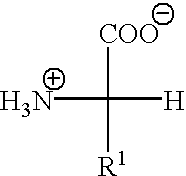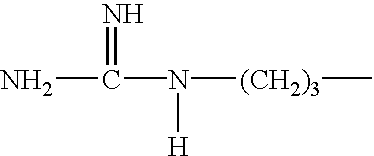Methods for controlling peptide solubility, chemically modified peptides, and stable solvent systems for producing same
a technology of chemical modification and solvent system, applied in the direction of peptides, peptide sources, peptide/protein ingredients, etc., can solve the problems of relatively limited chemical and engineering properties of water soluble keratin peptides, and achieve the effect of reducing the number of peptides
- Summary
- Abstract
- Description
- Claims
- Application Information
AI Technical Summary
Benefits of technology
Problems solved by technology
Method used
Image
Examples
example 1
[0175] Oxidation of Human Hair
[0176] 500 g of clean, dry hair was placed in a 12-liter glass reactor with a TEFLON.TM.-coated magnetic stir bar. 8380 mL of a 1 weight / volume percent solution of hydrogen peroxide (H.sub.2O.sub.2) was added and the hair was completely wetted and immersed. The reactor was fitted with a lid and water-cooled condenser, and the reaction heated to reflux for varying time periods from 0 to 180 minutes, specifically for 0, 30, 60, 120, and 180 minutes, with stirring. After the time period was complete, the reactor was disassembled and the hair immediately filtered and rinsed with deionized (DI) water. The filtrate was discarded and the oxidized hair allowed to air dry.
[0177] The samples were each separately reduced in subsequent steps.
[0178] Reduction of Oxidized Human Hair
[0179] The pH of a IN thioglycolate solution was adjusted to 11 using ammonium hydroxide. 10 g of air-dried, oxidized hair was placed in a 250 mL glass reaction flask with a TEFLON.TM.-coa...
example 2
[0185] In order to explore the extremes of processing parameters, two different types of water soluble keratins are generated. One type is treated solely oxidatively, and one type is treated solely reductively.
[0186] The completely oxidized water soluble keratins are produced using H.sub.2O.sub.2 under the conditions described in Example 1. The oxidized keratins contain only sulfonic residues in place of cystine and represent the extreme of a polyionic keratins, under these conditions. The completely oxidized keratins contain no useful functionality resulting from the H.sub.2O.sub.2 reaction with cystine. The only opportunity for modification rests with other amino acid residues. The isoelectric point of this type of keratin will be strongly influenced by the polyionic nature of the protein.
[0187] The production of completely reduced water soluble keratins presents some challenges. Methods typically employed to reduce cystine residues, such as those described in Example 1, do not re...
PUM
| Property | Measurement | Unit |
|---|---|---|
| Isoelectric point | aaaaa | aaaaa |
| Isoelectric point | aaaaa | aaaaa |
| Isoelectric point | aaaaa | aaaaa |
Abstract
Description
Claims
Application Information
 Login to View More
Login to View More - R&D
- Intellectual Property
- Life Sciences
- Materials
- Tech Scout
- Unparalleled Data Quality
- Higher Quality Content
- 60% Fewer Hallucinations
Browse by: Latest US Patents, China's latest patents, Technical Efficacy Thesaurus, Application Domain, Technology Topic, Popular Technical Reports.
© 2025 PatSnap. All rights reserved.Legal|Privacy policy|Modern Slavery Act Transparency Statement|Sitemap|About US| Contact US: help@patsnap.com



